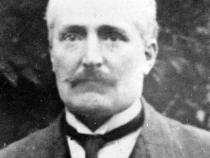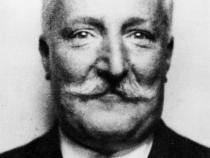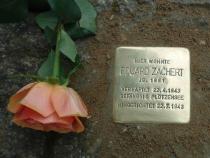Location
Mendelssohnstraße 10
District
Prenzlauer Berg
Stone was laid
June 2009
Born
08 March 1881 in Berlin
Occupation
Ledererarbeiter u. a. / Stadtverordneter
Verhaftet
22 April 1943
in
Verhaftet
April 1943 to July 1943
in
Berlin-Plötzensee
Excecuted
22 July 1943 in Berlin-Plötzensee
But those who have consciously taken part in this war and all the barbarities, including the violation of international law, will be judged on the evidence and called to account. Luckily, this does not include most of the German population and probably not you, as far as I know, Herr K. But if you are for this war etc then I and many of your guests, probably the majority, will no longer come to your establishment. The main aim of this letter is to warn you against indirectly becoming a jointly guilty party in this war.
Letter from Eduard Zachert to a restaurant proprietor, 16. 10. 1942
Eduard Zachert was orphaned at the age of eight. He trained as a leather worker. Toward the end of his military service, he was sent to China to help suppress the uprising against foreign imperialism known as the Boxer Rebellion. Commended by his deployment abroad, he became a post office official in 1901. In 1906, he was elected to the Berlin board of the post office officials’ trade union. He served for two years as a soldier in the First World War, during which time he joined the USPD. Because of his political activities, he was detained for three months in 1920. He was elected to Prenzlauer Berg council the same year. In 1922, he went over to the SPD. From 1924 to 1932, he was a member of the Prussian state parliament. During the same period, he was actively involved in various associations for post office workers, which eventually merged to become the German Postal Workers Labour Union. Zachert was dismissed by the German Reichspost in 1933 for political reasons. He was in a resistance group made up of former SPD members which distributed banned writings. He was arrested in July 1934 for defending the former government to a Jewish assembly and was subjected to severe physical abuse. He was released after three months and started working as an insurance agent. In October 1942, he wrote to a landlord in whose establishment he had overheard a discussion about the war. He warned him against letting his son become an officer because the war was unjust and should not be won. Germany’s opponents were in any case so strong, he wrote, that the war could not be won. The typed letter was not signed, but the landlord gave it to the Gestapo which ascertained that Zachert had written it. On 30.4.1943, the People's Court sentenced him to death for subversion of the armed forces. He was executed in Berlin-Plötzensee three months later. A street in Berlin-Lichtenberg was named after Zachert on 31.5.1951.
Eduard Zachert was a city councillor from 1923 – 1925, Constituency 4 Prenzlauer Berg (SPD)
Letter from Eduard Zachert to a restaurant proprietor, 16. 10. 1942
Eduard Zachert was orphaned at the age of eight. He trained as a leather worker. Toward the end of his military service, he was sent to China to help suppress the uprising against foreign imperialism known as the Boxer Rebellion. Commended by his deployment abroad, he became a post office official in 1901. In 1906, he was elected to the Berlin board of the post office officials’ trade union. He served for two years as a soldier in the First World War, during which time he joined the USPD. Because of his political activities, he was detained for three months in 1920. He was elected to Prenzlauer Berg council the same year. In 1922, he went over to the SPD. From 1924 to 1932, he was a member of the Prussian state parliament. During the same period, he was actively involved in various associations for post office workers, which eventually merged to become the German Postal Workers Labour Union. Zachert was dismissed by the German Reichspost in 1933 for political reasons. He was in a resistance group made up of former SPD members which distributed banned writings. He was arrested in July 1934 for defending the former government to a Jewish assembly and was subjected to severe physical abuse. He was released after three months and started working as an insurance agent. In October 1942, he wrote to a landlord in whose establishment he had overheard a discussion about the war. He warned him against letting his son become an officer because the war was unjust and should not be won. Germany’s opponents were in any case so strong, he wrote, that the war could not be won. The typed letter was not signed, but the landlord gave it to the Gestapo which ascertained that Zachert had written it. On 30.4.1943, the People's Court sentenced him to death for subversion of the armed forces. He was executed in Berlin-Plötzensee three months later. A street in Berlin-Lichtenberg was named after Zachert on 31.5.1951.
Eduard Zachert was a city councillor from 1923 – 1925, Constituency 4 Prenzlauer Berg (SPD)






